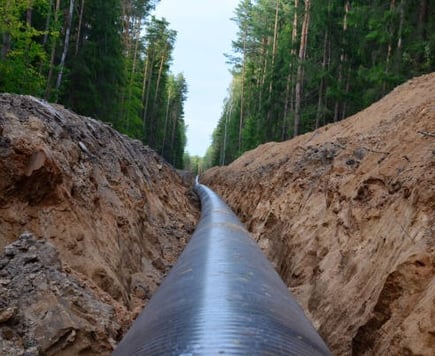Utility-supplied natural gas (methane) is the primary heating fuel in both Massachusetts and Rhode Island, supplying 52% and 54% of homes, respectively. Given their mandates to achieve net-zero emissions by 2050, both states are exploring strategies to transition away from their prevalent gas distribution systems. However, reducing and ultimately eliminating emissions from the heating sector, and doing so in a manner that minimizes costs to utility consumers and the state, is a formidable policy challenge. It will be an interesting journey, but one that must be taken.
The Future of Gas in Massachusetts
 Since 2020, the Massachusetts Department of Public Utilities (DPU) has been investigating how the state’s gas companies can reduce their emissions at the rate required by the Commonwealth’s emission reduction targets. This process, with a docket number of 20-80, or known as “The Future of Gas”, recently concluded with the DPU releasing a 140-page order on Dec 6th. While many environmentalists were initially concerned by the DPU's actions early in the investigation, the participation of several environmental groups, the Attorney General’s office, and with the leadership of two new DPU Commissioners appointed by Governor Healey, led the final 20-80 order to be one of the most important documents in the history of Massachusetts' fight against climate change.
Since 2020, the Massachusetts Department of Public Utilities (DPU) has been investigating how the state’s gas companies can reduce their emissions at the rate required by the Commonwealth’s emission reduction targets. This process, with a docket number of 20-80, or known as “The Future of Gas”, recently concluded with the DPU releasing a 140-page order on Dec 6th. While many environmentalists were initially concerned by the DPU's actions early in the investigation, the participation of several environmental groups, the Attorney General’s office, and with the leadership of two new DPU Commissioners appointed by Governor Healey, led the final 20-80 order to be one of the most important documents in the history of Massachusetts' fight against climate change.
For the last several years, there has been a debate between environmentalists, who argued the natural gas system needed to be decommissioned and buildings that used gas switched to electric heating, and gas companies, who argued the best way to reduce emissions from the gas system was to switch to “low-emitting” gasses like renewable natural gas and hydrogen. In a major victory for the climate, the final 20-80 order came down firmly on the side of decommissioning the gas system and building electrification.
Some of the major highlights of the Dec 6th 20-80 document are:
- Introduction of policies that make building new gas infrastructure more financially risky and less profitable for gas companies
- Shifting more costs to potential new gas customers to connect their building to the gas system (rather than passing some of the cost on to existing customers)
- Mandating gas companies to file emissions reduction plans every five years and tying company profits to progress
- Ordering gas and electric utilities to coordinate on reducing gas company emissions
- Beginning the process of reforming electric and gas rates to increase affordability for low-income customers and incentivize heating electrification
Those changes, along with several others outlined in the order, move companies from a framework that incentivizes expanding and selling more gas to one requiring them to reduce emissions and oversee a managed decline of the gas system. 20-80 signals that the days of methane gas as a heating source in Massachusetts are numbered, with 2050 being the outside date.
Rhode Island’s Approach
In 2022, the Rhode Island Public Utilities Commission (RIPUC) kicked off a similar investigation (Docket No. 22-01-NG) into the gas distribution system. However, unlike Massachusetts, the RIPUC created a Future of Gas Stakeholder committee, which we and several other advocates sit on, in addition to Rhode Island Energy, the Department of Environmental Management, the Office of Energy Resources, the Attorney General's office, and representatives from significant industries. This committee meets monthly to provide input to the PUC and a consultant as they consider ways to reduce greenhouse gas emissions from the gas distribution system. The consultant is expected to issue a report, along with policy recommendations, by the summer of 2024. We are advocating for this report to recommend a transition away from the gas distribution system in favor of electrification, essentially the recent MA 20-80 order or better.
This is Just The Start In Massachusetts
 While the DPU’s actions are a major victory, there are several major areas where legislative action is urgently needed, either to give the DPU the authority it needs to reduce emissions from the gas system or to reduce building emissions that fall outside of the DPU’s jurisdiction.
While the DPU’s actions are a major victory, there are several major areas where legislative action is urgently needed, either to give the DPU the authority it needs to reduce emissions from the gas system or to reduce building emissions that fall outside of the DPU’s jurisdiction.
As the DPU order points out, state law gives the DPU conflicting mandates that require it to both help facilitate the expansion of the natural gas system (which would increase emissions), while at the same time requiring it to reduce greenhouse gas emissions from the natural gas system. To fix this issue, Section 3 of the Gas Leaks Act must be repealed which would allow the DPU to stop natural gas system expansions.
Another area that needs legislative action is changing the obligation to serve. Right now gas utilities are obligated to serve gas to customers in their area that ask for gas service. There are two potential solutions to this problem: remove the obligation to serve gas altogether or allow gas companies to meet their obligations by supplying heat in more ways, such as connecting customers to a networked geothermal system or installing an air source heat pump.
The major advantage of giving gas utilities more ways to meet their obligation to serve is that it would allow them to reduce the number of gas customers and retire leaky pipes, two things that need to happen, without simply abandoning former gas customers to figure out a new way to heat their homes by themselves. Instead, homeowners who do not have the time or financial ability to electrify their homes and install a heat pump can receive assistance from their former gas utility. However, we do not favor giving utilities monopolies over electrification. Consumers who want heat pumps or networked geothermal ought to benefit from competition.
Utility Commissions Cannot Do It All
There is a long list of building emission reduction measures that are outside the jurisdiction of the Mass. DPU or the Rhode Island PUC. One example is regulating emissions from large buildings or propane and oil heat. There isn’t space in this post to go through everything that needs to happen to reduce building emissions. However, the Clean Heat Platform, supported by climate groups across Massachusetts, outlines changes in building policy that need to be made in more detail.
Take Action
If you want to help make sure the Massachusetts legislature passes a strong building emission reduction legislation this session please take a moment to contact your State Senator and Representative and ask them to support the Clean Heat Platform and reforming the obligation to serve. If you have questions, email carrie@greenenergyconsumers.org.
In Rhode Island, while we are advocating for a good order from the RIPUC, we will also need legislation for complementary policies outside of the PUC’s jurisdiction. Stay tuned for a blog on our 2024 legislative priorities and how you can take action. If you have questions, email amanda@greenenergyconsumers.org.
 Since 2020, the Massachusetts Department of Public Utilities (DPU) has been investigating how the state’s gas companies can reduce their emissions at the rate required by the Commonwealth’s emission reduction targets. This process, with a docket number of 20-80, or known as “The Future of Gas”, recently concluded with the DPU releasing a
Since 2020, the Massachusetts Department of Public Utilities (DPU) has been investigating how the state’s gas companies can reduce their emissions at the rate required by the Commonwealth’s emission reduction targets. This process, with a docket number of 20-80, or known as “The Future of Gas”, recently concluded with the DPU releasing a  While the DPU’s actions are a major victory, there are several major areas where legislative action is urgently needed, either to give the DPU the authority it needs to reduce emissions from the gas system or to reduce building emissions that fall outside of the DPU’s jurisdiction.
While the DPU’s actions are a major victory, there are several major areas where legislative action is urgently needed, either to give the DPU the authority it needs to reduce emissions from the gas system or to reduce building emissions that fall outside of the DPU’s jurisdiction.
Comments